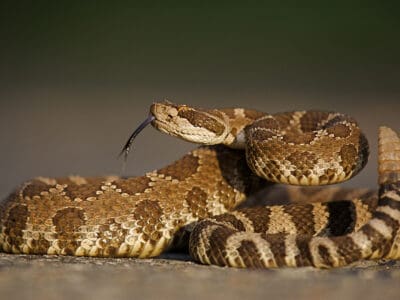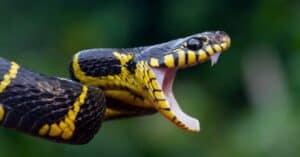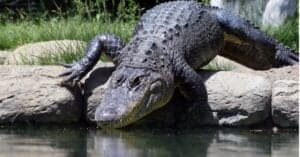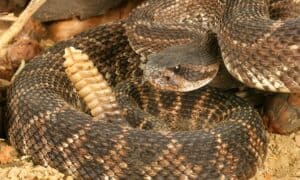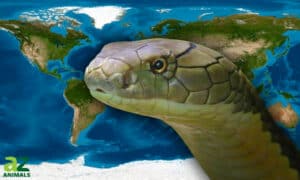Crocodile vs Shark: Who Would Win in a Fight?
Crocodiles and sharks are two of the most dangerous predators in the world. Interestingly, they are two creatures that have not changed much in millions of years because they’re already perfect at what they do: eat other animals. Being that crocodiles live in many places around the world but need to stay close to land for food, the chances of a crocodile vs shark match ever happening are low.
Yet, we can use the available data about these creatures to predict what would happen if a shark and a crocodile managed to cross paths in the water; perhaps a great white shark swims a little too close to the shores in South America or gets lost in the Nile River. Or maybe a massive saltwater crocodile in the ocean finds itself nose to nose with a hammerhead while riding an ocean current.
Comparing the important data about these two creatures would ultimately show us which of these creatures would win; let us show you how it would play out!
Comparing a Crocodile and a Shark
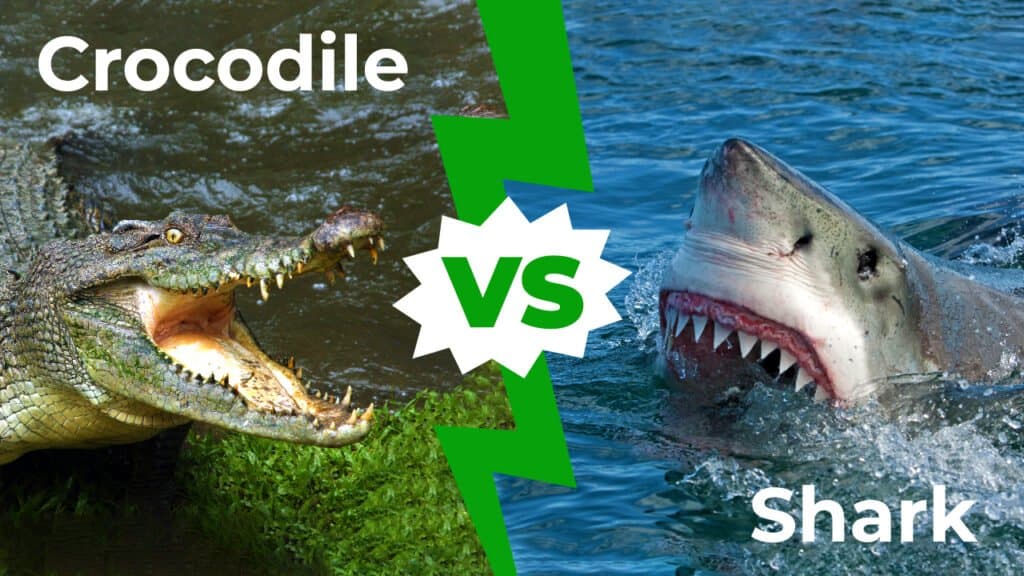
A-Z-Animals.com
| Crocodile | Shark | |
| Size | Weight: 300-2,000lbs Length: 10ft – 20ft |
Weight: 1,000lbs – 2,400lbs Length: 11ft – 21ft |
| Speed and Movement Type | – 22 mph on land – Very fast crawling motion – 15mph in water propelled by its tail |
– 20mph – 35mph – Uses an undulating, side-to-side motion from the tail and body. |
| Bite Power and Teeth | 3,700PSI bite power – 4-inch teeth – 66 conical teeth |
– 4,000 PSI -About 50 teeth are available to bite in the first row, but 300 teeth overall – Teeth up to 2.5 inches long |
| Senses | – Great nocturnal vision and underwater vision – Pressure receptors help crocodiles identify changes around them |
– Good vision with sharp focus and night vision – Great whites hear low frequencies, but it’s not their best sense. – Incredible smell for substances at 1 part per 10 billion parts of water – Possess ampullae of Lorenzini to detect electrical fields |
| Defenses | – Tough skin – Ability to travel on land and water – Speed |
– Large size – Bursts of swim speed |
| Offensive Capabilities | – Incredibly powerful bite – Death roll can instantly remove large chunks of flesh. |
– Massive biting power – Long, triangular teeth – Fast swim speed |
| Predatory Behavior | – Ambush predators that wait in the water for prey to approach. | – Relies on stealth and ambush to attack |
The Key Factors in a Fight Between a Crocodile and a Shark
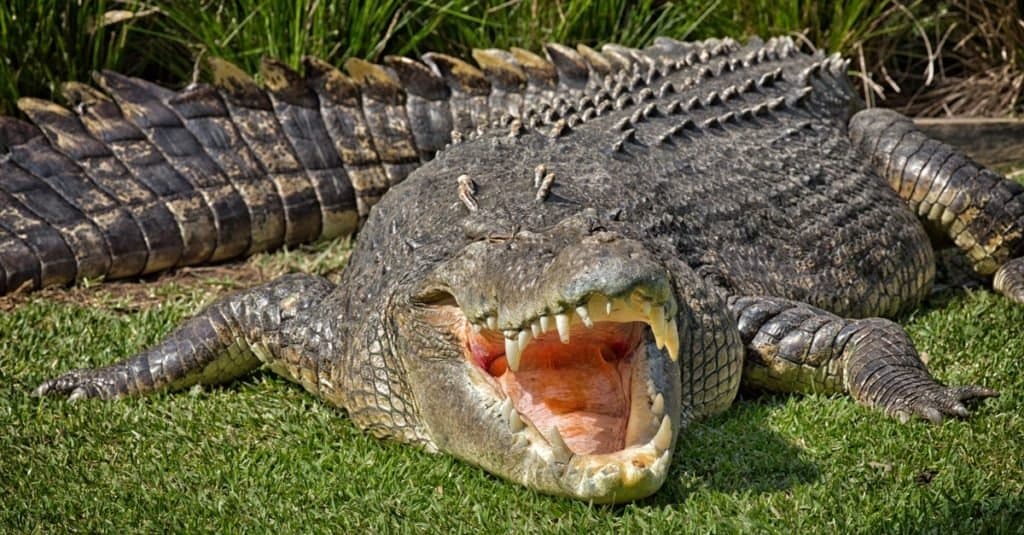
PomInOz/Shutterstock.com
We don’t need to know everything about a crocodile and a shark to determine which one wins a battle. Focusing on a handful of significant traits that have the most impact on fights in the wild will give us all the insight we need.
We have compiled a list of six points of data about these creatures that will show us which has the advantages in several areas. Whichever animal has the greatest advantages in physical features and fighting abilities will likely win.
Physical Features of a Crocodile and a Shark
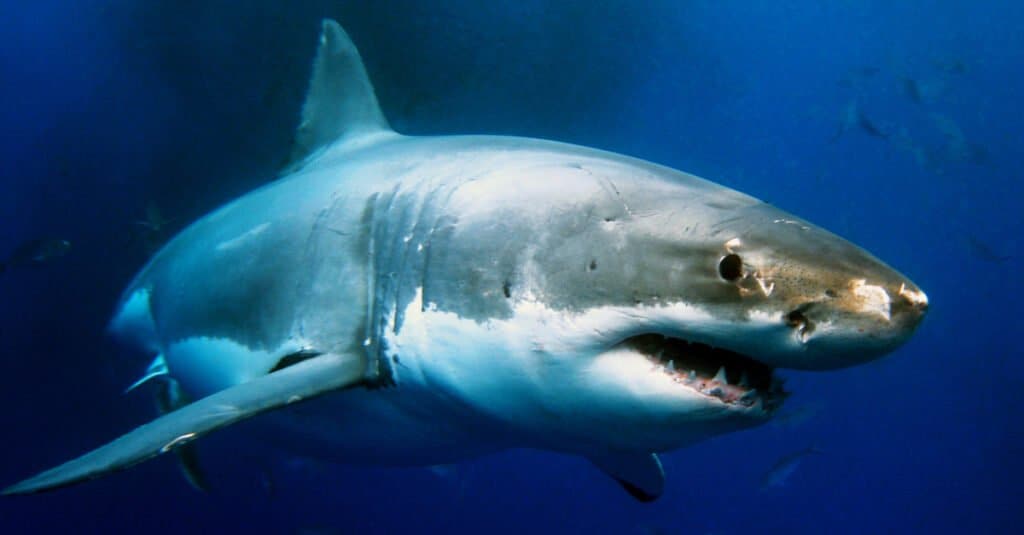
The easiest way to determine which creature has an edge in a fight is by comparing physical features. Larger, stronger animals that are more aware of their environment tend to do best in a battle. Consider these five areas of information and see which of the animals has the advantage over the other.
Crocodile vs Shark: Size
The size and weight of sharks and crocodiles are remarkably similar, with a crocodile capable of reaching 2,000lbs in weight and measuring 20ft long. A great white shark can weigh about 2,400lbs and reach 21ft in length.
Yet, when comparing maximum sizes, a stark difference emerges. The largest crocodile ever recorded was a saltwater crocodile named Lolong that reached 2,370 pounds. Meanwhile the largest great white shark on record is named Deep Blue and weighs a massive 5,000 pounds.
The shark is larger than the crocodile, so it gets the advantage.
Crocodile vs Shark: Speed and Movement
Crocodiles can move swiftly on land and in the water, reaching speeds of 22mph on land and 15mph in the water aided by the movement of their tail. Sharks also use a side-to-side motion of their tail to reach speeds of 35mph beneath the waves.
Sharks are faster than crocodiles in the water, so they get the advantage.
Crocodile vs Shark: Bite Power and Teeth
The crocodile has the strongest bite of any terrestrial animal at 3,700PSI while also using 66, 4-inch-long teeth on their prey. Sharks have them beat, though. They bite at 4,000PSI with 300 serrated teeth measuring more than two inches. The contest is close, and you’ll often see lists that rank the saltwater crocodile as the most powerful bite force. There’s a key reason for that, scientists have actually measured the bite of a saltwater crocodile whereas great white bites are based upon a computer model.
Regardless, we’ll give a very slight edge to the great white for the sake of this showdown because their teeth are sharper while crocodile teeth are blunt and used to hold prey in their mouth.
Sharks have the edge in bite power and teeth.
Crocodile vs Shark: Senses
Crocodiles have all the senses they need to detect when creatures move around them. Their ability to detect changes in pressure along with their very good vision helps them find and kill prey with ease.
Sharks have even more profound senses, capable of seeing well underwater and in low-light conditions. They can also smell better than just about anything in the water, sensing 1 part per 10 billion parts of some substances in the water. On top of that, they can also detect electrical fields given off by their prey.
Sharks have much better senses, a frightening concept being that the crocodile is such a capable killer.
Crocodile vs Shark: Physical Defenses
Sharks have massive size and bursts of speed to keep them safe from attackers. Crocodiles have tough skin, the ability to move in and out of the water, and have a high rate of speed on land and water.
With all that in mind, crocodiles have the best defenses and get the advantage.
Combat Skills of a Crocodile and a Shark
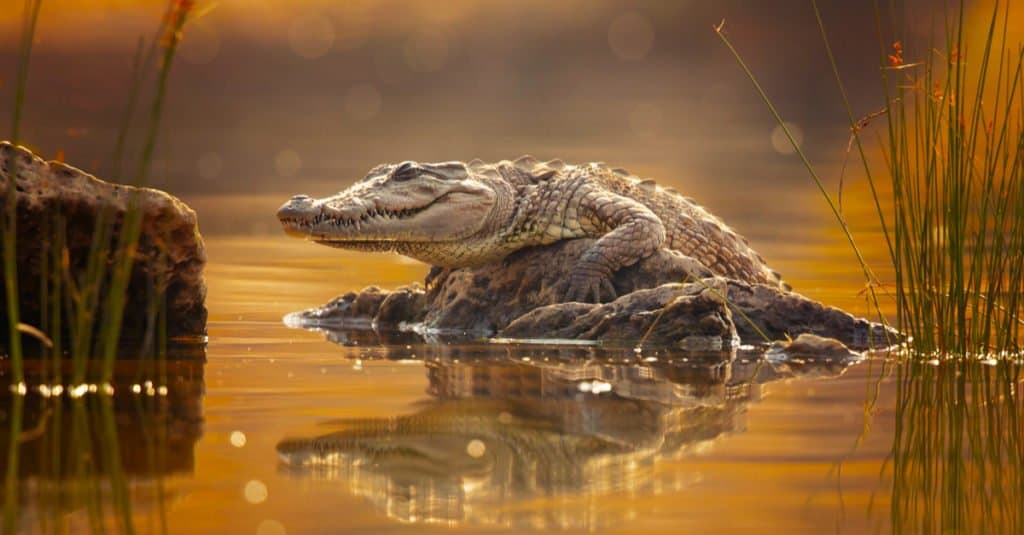
Milan Zygmunt/Shutterstock.com
When it comes to combat skills, both sharks and crocodiles are ambush predators. They sense an enemy and then brutally attack with their powerful bites in an attempt to overwhelm their enemy.
The shark is very straightforward with its attacks: it bites and thrashes its enemy until it’s dead. Crocodiles have another trick: the death roll. They bite something, latch down on it, and then roll until that piece of flesh is removed from the enemy.
It’s hard to say which creature has the better combat skills, so we’re going to call this area a tie.
What Are Key Differences Between a Crocodile and a Shark?
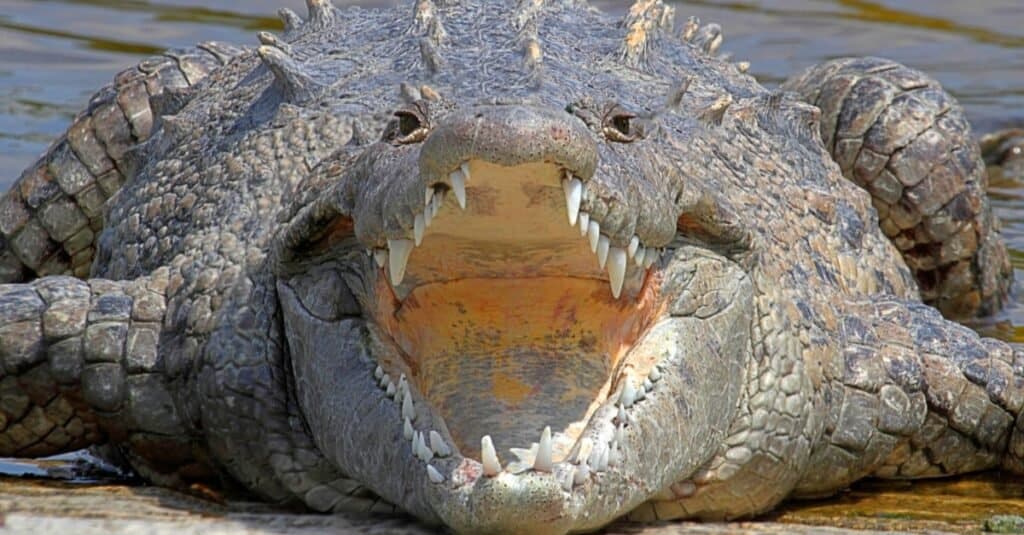
Sharks are cartilaginous fish and crocodiles are reptiles. Great white sharks can generally weigh up to 2,400lbs and measure 21ft long, and crocodiles can weigh 2,000lbs and grow up to 20ft long. Although both creatures use their teeth to kill their prey, sharks’ teeth are serrated to tear large amounts of flesh while crocodiles’ teeth are conical and used to grab prey.
Crocodiles are semiaquatic and spend significant portions of their time in the water, but sharks are aquatic and spend all of their time in the water. These are the most significant differences between the two animals.
Who Would Win in a Fight Between a Crocodile and a Shark?
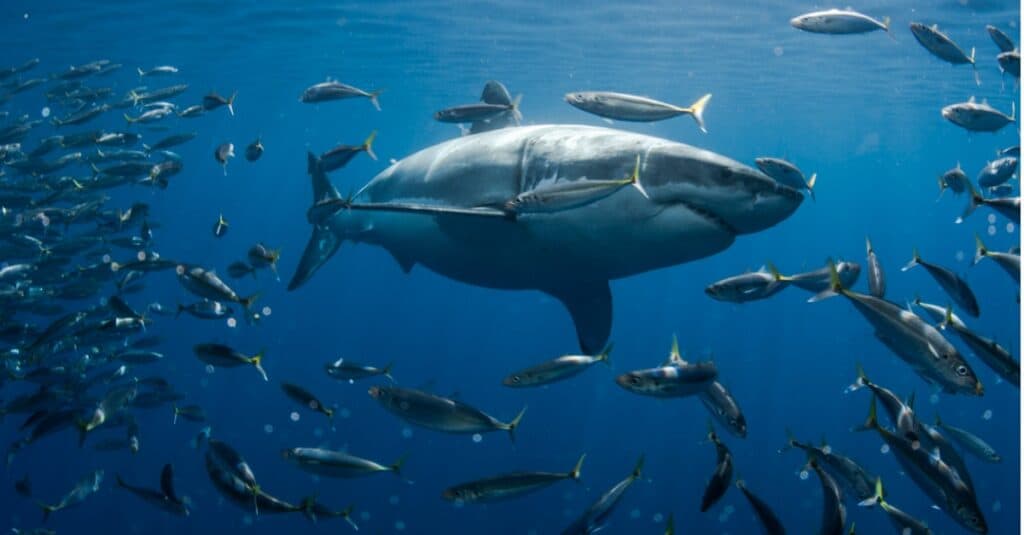
iStock.com/atese
A shark would win a fight against a crocodile for many reasons. A shark would have the sensing advantage over a crocodile, easily finding the other creature first. At that point, the shark would go on the offensive, attacking the crocodile at full speed, landing the critical first blow.
Sharks can rend huge chunks from their foes with a single bite, and it could kill or severely incapacitate a crocodile before the latter responds. However, if a croc did respond, it would certainly do some damage to the shark. Those puncture wounds could be harmful, but the croc would probably not have the power to perform a death roll against the larger creature.
The shark could go for another bite as soon as the crocodile tries moving again, and it would aim for a more permanent solution, biting down on the crocs head, legs, or other vital areas.
The fight would be brutal and fast-paced, but there are few paths to victory for the crocodile while the shark only has to land one or two devastating bites to turn the fight in their favor.
More from A-Z Animals
Crocodiles and sharks are two of the most dangerous predators in the world. Interestingly, they are two creatures that have not changed much in millions of years because they’re already perfect at what they do: eat other animals. Being that crocodiles live in many places around the world but need to stay close to land for food, the chances of a crocodile vs shark match ever happening are low.
Yet, we can use the available data about these creatures to predict what would happen if a shark and a crocodile managed to cross paths in the water; perhaps a great white shark swims a little too close to the shores in South America or gets lost in the Nile River. Or maybe a massive saltwater crocodile in the ocean finds itself nose to nose with a hammerhead while riding an ocean current.
Comparing the important data about these two creatures would ultimately show us which of these creatures would win; let us show you how it would play out!
Comparing a Crocodile and a Shark

A-Z-Animals.com
| Crocodile | Shark | |
| Size | Weight: 300-2,000lbs Length: 10ft – 20ft |
Weight: 1,000lbs – 2,400lbs Length: 11ft – 21ft |
| Speed and Movement Type | – 22 mph on land – Very fast crawling motion – 15mph in water propelled by its tail |
– 20mph – 35mph – Uses an undulating, side-to-side motion from the tail and body. |
| Bite Power and Teeth | 3,700PSI bite power – 4-inch teeth – 66 conical teeth |
– 4,000 PSI -About 50 teeth are available to bite in the first row, but 300 teeth overall – Teeth up to 2.5 inches long |
| Senses | – Great nocturnal vision and underwater vision – Pressure receptors help crocodiles identify changes around them |
– Good vision with sharp focus and night vision – Great whites hear low frequencies, but it’s not their best sense. – Incredible smell for substances at 1 part per 10 billion parts of water – Possess ampullae of Lorenzini to detect electrical fields |
| Defenses | – Tough skin – Ability to travel on land and water – Speed |
– Large size – Bursts of swim speed |
| Offensive Capabilities | – Incredibly powerful bite – Death roll can instantly remove large chunks of flesh. |
– Massive biting power – Long, triangular teeth – Fast swim speed |
| Predatory Behavior | – Ambush predators that wait in the water for prey to approach. | – Relies on stealth and ambush to attack |
The Key Factors in a Fight Between a Crocodile and a Shark

PomInOz/Shutterstock.com
We don’t need to know everything about a crocodile and a shark to determine which one wins a battle. Focusing on a handful of significant traits that have the most impact on fights in the wild will give us all the insight we need.
We have compiled a list of six points of data about these creatures that will show us which has the advantages in several areas. Whichever animal has the greatest advantages in physical features and fighting abilities will likely win.
Physical Features of a Crocodile and a Shark

The easiest way to determine which creature has an edge in a fight is by comparing physical features. Larger, stronger animals that are more aware of their environment tend to do best in a battle. Consider these five areas of information and see which of the animals has the advantage over the other.
Crocodile vs Shark: Size
The size and weight of sharks and crocodiles are remarkably similar, with a crocodile capable of reaching 2,000lbs in weight and measuring 20ft long. A great white shark can weigh about 2,400lbs and reach 21ft in length.
Yet, when comparing maximum sizes, a stark difference emerges. The largest crocodile ever recorded was a saltwater crocodile named Lolong that reached 2,370 pounds. Meanwhile the largest great white shark on record is named Deep Blue and weighs a massive 5,000 pounds.
The shark is larger than the crocodile, so it gets the advantage.
Crocodile vs Shark: Speed and Movement
Crocodiles can move swiftly on land and in the water, reaching speeds of 22mph on land and 15mph in the water aided by the movement of their tail. Sharks also use a side-to-side motion of their tail to reach speeds of 35mph beneath the waves.
Sharks are faster than crocodiles in the water, so they get the advantage.
Crocodile vs Shark: Bite Power and Teeth
The crocodile has the strongest bite of any terrestrial animal at 3,700PSI while also using 66, 4-inch-long teeth on their prey. Sharks have them beat, though. They bite at 4,000PSI with 300 serrated teeth measuring more than two inches. The contest is close, and you’ll often see lists that rank the saltwater crocodile as the most powerful bite force. There’s a key reason for that, scientists have actually measured the bite of a saltwater crocodile whereas great white bites are based upon a computer model.
Regardless, we’ll give a very slight edge to the great white for the sake of this showdown because their teeth are sharper while crocodile teeth are blunt and used to hold prey in their mouth.
Sharks have the edge in bite power and teeth.
Crocodile vs Shark: Senses
Crocodiles have all the senses they need to detect when creatures move around them. Their ability to detect changes in pressure along with their very good vision helps them find and kill prey with ease.
Sharks have even more profound senses, capable of seeing well underwater and in low-light conditions. They can also smell better than just about anything in the water, sensing 1 part per 10 billion parts of some substances in the water. On top of that, they can also detect electrical fields given off by their prey.
Sharks have much better senses, a frightening concept being that the crocodile is such a capable killer.
Crocodile vs Shark: Physical Defenses
Sharks have massive size and bursts of speed to keep them safe from attackers. Crocodiles have tough skin, the ability to move in and out of the water, and have a high rate of speed on land and water.
With all that in mind, crocodiles have the best defenses and get the advantage.
Combat Skills of a Crocodile and a Shark

Milan Zygmunt/Shutterstock.com
When it comes to combat skills, both sharks and crocodiles are ambush predators. They sense an enemy and then brutally attack with their powerful bites in an attempt to overwhelm their enemy.
The shark is very straightforward with its attacks: it bites and thrashes its enemy until it’s dead. Crocodiles have another trick: the death roll. They bite something, latch down on it, and then roll until that piece of flesh is removed from the enemy.
It’s hard to say which creature has the better combat skills, so we’re going to call this area a tie.
What Are Key Differences Between a Crocodile and a Shark?

Sharks are cartilaginous fish and crocodiles are reptiles. Great white sharks can generally weigh up to 2,400lbs and measure 21ft long, and crocodiles can weigh 2,000lbs and grow up to 20ft long. Although both creatures use their teeth to kill their prey, sharks’ teeth are serrated to tear large amounts of flesh while crocodiles’ teeth are conical and used to grab prey.
Crocodiles are semiaquatic and spend significant portions of their time in the water, but sharks are aquatic and spend all of their time in the water. These are the most significant differences between the two animals.
Who Would Win in a Fight Between a Crocodile and a Shark?

iStock.com/atese
A shark would win a fight against a crocodile for many reasons. A shark would have the sensing advantage over a crocodile, easily finding the other creature first. At that point, the shark would go on the offensive, attacking the crocodile at full speed, landing the critical first blow.
Sharks can rend huge chunks from their foes with a single bite, and it could kill or severely incapacitate a crocodile before the latter responds. However, if a croc did respond, it would certainly do some damage to the shark. Those puncture wounds could be harmful, but the croc would probably not have the power to perform a death roll against the larger creature.
The shark could go for another bite as soon as the crocodile tries moving again, and it would aim for a more permanent solution, biting down on the crocs head, legs, or other vital areas.
The fight would be brutal and fast-paced, but there are few paths to victory for the crocodile while the shark only has to land one or two devastating bites to turn the fight in their favor.

